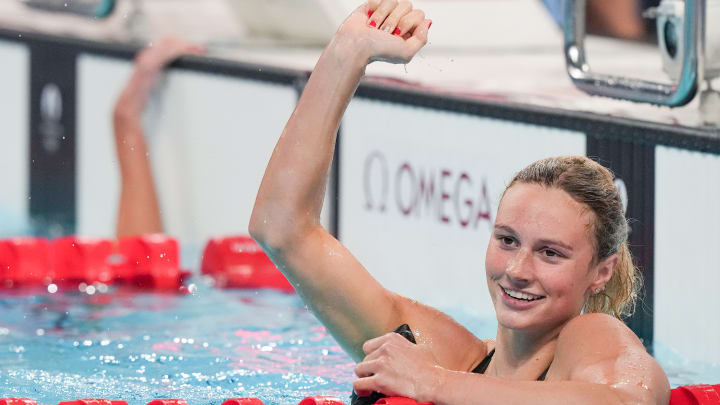There’s No Doubt That Summer McIntosh’s Olympic Gold Will Be the First of Many

Check out Sports Illustrated’s Daily Rings, our daily Olympics podcast from Mitch Goldich and Dan Gartland. Subscribe wherever you get your podcasts (Apple, Spotify) and find clips onSI’s YouTube page.
NANTERRE, France — Summer McIntosh is not yet 18, but when she arrived at the Paris La Défense Arena pool for the 400-meter individual medley final Monday evening, she was not just expected to win a gold medal. It was assumed she would win the gold medal. McIntosh had already won silver in the 400 free, and while every Olympic silver is an amazing achievement, silver in a race when Katie Ledecky wins bronze feels even more impressive. But McIntosh merely competes in the 400 free. The 400 IM, she owns.
This is where we would normally talk about the extraordinary pressure a 17-year-old in that situation must feel, but it would be a bit disingenuous. At last year’s world championships, McIntosh won the 400 IM by more than four seconds. Since then, she has gotten faster: She set the world record of 4:24.38 at the Canadian Olympic Trials.
Pressure was not going to cost McIntosh gold. A stomach virus, maybe. But not pressure.
McIntosh knew it, too, not because she is arrogant, but because she knows what she is capable of.
She said afterward that as she made the turn in the breaststroke, “I kind of looked around to make sure I was in a comfortable lead.” The race was not even half over.
“I definitely knew that I had the gold medal going into that last 100 meters,” McIntosh said.
It was her first gold medal, and even that sounds absurd, inasmuch as it implies she will win more. But … she will win more. McIntosh won the 200 butterfly at the last two world championships; that race is Wednesday.
“Obviously, I'm super happy with the result, but now I'm all about the [200] fly on Day Five,” McIntosh said.
The question, with an athlete who is this good this young, is whether she appreciates how special it is to win gold. McIntosh’s official answer: “Oh, yeah, for sure. I mean, definitely pretty surreal. I was very happy to get the job done tonight. That was a goal of mine, to be able to stand on top of the podium and get the gold medal.”
The honest answer is that she probably can’t appreciate this. Not fully. She can understand it intellectually, and she can try to savor it. But McIntosh is still just 17. Appreciation can only come later, after life experience and some tougher moments in the pool allow her to put this into proper emotional context. It is fair to say Michael Phelps appreciates the six gold medals he won in Athens a lot more now than he did in 2004. Katie Ledecky was 15 when she won her first gold medal. Who can make sense of something like that at 15?
Full appreciation is the gift that McIntosh unknowingly wrapped for herself Monday night, to be opened at a much later date. For now, she at least seems to have avoided the traps that can come with others’ assumption of greatness.
Somebody asked if she felt any relief at winning gold. It was a reasonable question, considering her dominance. But relief at winning gold at 17 years old?
“Absolutely not,” McIntosh said. “There's definitely a lot of anticipation going into a race, but I wouldn't say necessarily nerves, and there's no relief. I'm just trying to soak up every single moment. … I still feel like I'm my 10-year-old self, and I'm just trying to solidify all those dreams I had growing up as a kid. I plan on being in the sport for as long as I can do it.”
